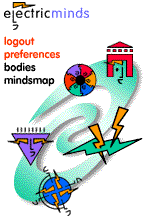
|

|
|
Push Media: The Web's Bug Zapper Push technology on the Web is like hitching a truck behind a horse, sitting in the driver's seat, and yelling "giddyap." The only greater idiocy would be calling this newfangled contraption the radical future of transportation. We seem to agree the Web represents a revolutionary paradigm shift in the way we interact with information. It has the potential to take us further and faster than we ever imagined possible. But before we can get anywhere, we're going to have to unhitch ourselves from the horse and cart model of traditional media. Push media is a reaction to information overload (a possible side effect of many-to-many publishing). Before the Web, information moved around our culture like flies in a two-story house. I'd swat a bug and you'd swat a bug and neither of us worried about the amount of information we had to process. Well, the Web is like a gigantic no-pest strip hanging from the kitchen ceiling. In the last few years, so many flies have built up some people think we're having a plague and are demanding the bug zapper. A traditional response to infoglut is to break information into discrete and manageable chunks and streams, thus all the magazines, newspapers, books, radio stations, and television channels. Push media, taking its cues from tradition, assumes the best way to handle the Web is to untangle the whole plate of spaghetti and lay each strand side by side as channels of information so users can tune in (and slurp up) one strand at a time. This creates a point-to-point connection between producers and consumers and uses the Web almost exclusively as a distribution network. A more progressive response to info-abundance is to treat it as an advantage. Like a solar energy panel, the Web can be used to harness the information individuals produce naturally and transform it into an extremely valuable resource which can be applied in many ways. Because information is produced directly at the individual level and stored in an unedited format, it is extremely fine-grained, differentiated, and plentiful and its concrescence over time only intensifies these features. As a tool, the Web is potentially a far more accurate push technology. It's the difference between gloves and mittens. In a push media system, consumers are inherently hampered. They can only request information using the parameters defined by the producer and they will only receive information supplied by the producer, which will always be a limited subset the information pool unless some company gets a monopoly on all the information in the world (watch out for Microsoft!). On the other hand, the Web stores all information produced by a many-to-many publishing system and supports mechanisms, like search engines, which empower the user to make unique requests followed by personal choices about the information they will eventually consume. Ideally, those search and request mechanisms will become so powerful, intelligent, perhaps sentient, that people will quickly and easily get answers to any and all questions no matter how obscure or specific. Imagine how this could possibly accelerate the learning or the creative process. How far do we want to go today? But wait, there's more! My favorite Dilbert cartoon is where Dogbert observes that simple things like molecules, cells, and electronics combine to form more powerful things like chemicals, life forms, and computers. Then he turns to Dilbert and says "what if God is the consciousness that will be created when enough of us are connected by the Internet." OK, so maybe we won't find God, but if we use the Web as a means of combining all the simple facts of existence, there is a very real possibility we will create something larger than life. At the very least, we will have constructed an opportunity to step outside of our limited sphere of knowledge and gain a unique perspective on events unavailable to us prior to the existence of the Net. What we're coming up with right now may seem inconsequential, coincidental or serendipitous, but it's because we're looking through the very first telescope of human consciousness everything is bound to look a little fuzzy and gray. If we continue to develop the Web toward these goals, we might eventually provoke a quantum leap in our understanding of who we are and how our world works. This is it folks, we're behind the wheel of a truck and it's time to unhitch that horse. Let's fire this baby up and see how far it can take us and how fast we can get there. |
jlennon said: Crashes in our personal computing are inconvenient and frustrating. In business however, they can become very expensive. Especially when one needs the tools or research or whatever to complete the given task or project. Netscape (3.0) started locking up on me last January. Several times a day. Despite crash guard. (Which I believe should have it's name changed from "Crash Guard" to "Stand By and Yell, 'Look Out!', After the User has Smashed Into the Pillar") About every third crash was a hard crash, requiring reboot. Most Active Topics: Topic 11 The Marc and The Beast Topic 13 Stop Crashing on Me! Topic 23 FYI: Fallback Plans | |||
| ||||
Also in Rant!: The Marc and The Beast Push Media: The Web's Bug Zapper Driving Their Industry into the Ground | ||||
|
electric minds |
virtual community center |
world wide jam |
edge tech |
tomorrow |
conversations
Any questions? We have answers.
©1996, 1997 electric minds, all rights reserved worldwide.
|


